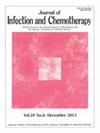Refractory invasive pulmonary aspergillosis caused by two Aspergillus species in an allogeneic hematopoietic stem cell transplantation recipient
IF 1.5
4区 医学
Q3 INFECTIOUS DISEASES
引用次数: 0
Abstract
Invasive fungal infections are critical complications in patients with hematological malignancies. Herein, we report a case of refractory invasive pulmonary aspergillosis (IPA) caused by two Aspergillus species in a recipient of hematopoietic stem cell transplantation. Repeated sputum cultures revealed causative pathogens, which were identified as Aspergillus terreus and Aspergillus flavus. The antifungal susceptibility testing showed that these Aspergillus species had a high minimal inhibitory concentration against amphotericin B, suggesting that they caused the refractory infection in this patient. Although the patient was treated with a combination of isavuconazole and micafungin, the IPA worsened, and the patient died due to multiple organ failure. The findings from this case highlight the complexity of refractory invasive fungal infections, wherein multiple fungal species can simultaneously affect patients, particularly those with severely compromised immune function. Further investigation is urgently required to improve the management strategies for refractory IPA, including early pathogen identification and novel antifungal agent development.
异基因造血干细胞移植受者两种曲霉引起的难治性侵袭性肺曲霉病。
侵袭性真菌感染是恶性血液病患者的重要并发症。在此,我们报告一例难治性侵袭性肺曲霉病(IPA)由两种曲霉引起的受体造血干细胞移植。反复痰培养发现病原为土曲霉和黄曲霉。抗真菌药敏试验显示,这些曲霉种对两性霉素B具有较高的最低抑菌浓度,提示是它们引起了该患者的难治性感染。患者虽经异唑康唑联合米卡芬金治疗,但IPA恶化,患者因多器官功能衰竭死亡。该病例的发现突出了难治性侵袭性真菌感染的复杂性,其中多种真菌可以同时影响患者,特别是那些免疫功能严重受损的患者。迫切需要进一步的研究来改善难治性IPA的管理策略,包括早期病原体识别和新型抗真菌药物的开发。
本文章由计算机程序翻译,如有差异,请以英文原文为准。
求助全文
约1分钟内获得全文
求助全文
来源期刊

Journal of Infection and Chemotherapy
INFECTIOUS DISEASES-PHARMACOLOGY & PHARMACY
CiteScore
4.10
自引率
4.50%
发文量
303
审稿时长
47 days
期刊介绍:
The Journal of Infection and Chemotherapy (JIC) — official journal of the Japanese Society of Chemotherapy and The Japanese Association for Infectious Diseases — welcomes original papers, laboratory or clinical, as well as case reports, notes, committee reports, surveillance and guidelines from all parts of the world on all aspects of chemotherapy, covering the pathogenesis, diagnosis, treatment, and control of infection, including treatment with anticancer drugs. Experimental studies on animal models and pharmacokinetics, and reports on epidemiology and clinical trials are particularly welcome.
 求助内容:
求助内容: 应助结果提醒方式:
应助结果提醒方式:


